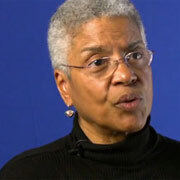Items
Array is exactly
Rutgers Administration
-
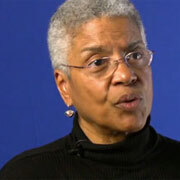 Interview: Clarke, Cheryl, 2012 Cheryl Clarke is a black lesbian feminist whose poetry, editorial work, and career at Rutgers have had a significant impact on black, lesbian, and women’s communities. She is the author of four collections of poetry, often centered around themes of black women’s issues and lesbian issues. She served as an editor of the lesbian publication Conditions for nine years and began working at Rutgers University in 1970. At Rutgers, she served as the founding Director of Diverse Community Affairs and Lesbian/Gay Concerns, which became the Office of Social Justice Education and LGBT Communities in 2004. She was the Dean of Students of Livingston Campus between 2009-2013 and retired from Rutgers in 2013 after 41 years of service. In this interview, Clarke discusses her upbringing in Washington, D.C. during the Civil Rights Movement, her passion for writing, and the role of feminism. Clarke proposes the idea that we, as a society, must be in the “project of transformation” to “create a new humanity” as we reconcile gender and race issues. --- See also an additional interview with Cheryl Clarke, recorded in 2018 by the Rutgers Oral History Archives.
Interview: Clarke, Cheryl, 2012 Cheryl Clarke is a black lesbian feminist whose poetry, editorial work, and career at Rutgers have had a significant impact on black, lesbian, and women’s communities. She is the author of four collections of poetry, often centered around themes of black women’s issues and lesbian issues. She served as an editor of the lesbian publication Conditions for nine years and began working at Rutgers University in 1970. At Rutgers, she served as the founding Director of Diverse Community Affairs and Lesbian/Gay Concerns, which became the Office of Social Justice Education and LGBT Communities in 2004. She was the Dean of Students of Livingston Campus between 2009-2013 and retired from Rutgers in 2013 after 41 years of service. In this interview, Clarke discusses her upbringing in Washington, D.C. during the Civil Rights Movement, her passion for writing, and the role of feminism. Clarke proposes the idea that we, as a society, must be in the “project of transformation” to “create a new humanity” as we reconcile gender and race issues. --- See also an additional interview with Cheryl Clarke, recorded in 2018 by the Rutgers Oral History Archives. -
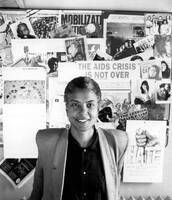 Interview: Clarke, Cheryl, 2018 Cheryl Clarke was born on May 16, 1947 in Washington, D.C. Her father served in the U.S. Army in the Red Ball Express in France after the Allied invasion in June 1944. Growing up in Northwest Washington, D.C., Cheryl attended parochial schools, including Immaculate Conception Academy for high school. From 1965 to 1969, Cheryl attended Howard University and majored in English. During college, she worked part time at the Washington Post and at a Peace Corps office. In 1969, Cheryl came to Rutgers-New Brunswick as a graduate student in English. She earned her M.A. in English in 1974. Cheryl taught courses in the Urban University Program and discusses educational opportunity programs in the interview. From 1972 to 1974, she taught courses in the English Department at Rutgers. A life-long activist, Cheryl discusses her many experiences participating in social movements, including the anti-war and Black Power movements at Howard University, anti-apartheid activism at Rutgers, LGBT activism, feminism and lesbian-feminism, and activism surrounding the defense of Assata Shakur. From 1974 to 1978, Cheryl worked in Middlesex County in the Comprehensive Employment and Training Program. In 1978, she returned to Rutgers to study social work, obtaining her M.S.W. in 1980. In 1980, Cheryl began working in Student Affairs at Rutgers. In 1992, she served as the founding director of the Office of Diverse Community Affairs and Lesbian/Gay Concerns (now called the Center for Social Justice Education and LGBT Communities). From 2009 to 2013, Cheryl served as the Dean of Students for Livingston Campus. In 2000, she earned her Ph.D. in English. At Rutgers, Cheryl coordinated the university-wide Committee to Advance Our Common Purposes and the New Brunswick-wide Bias Prevention Education Committee, in addition to establishing the university-wide network of "Liaisons" and teaching numerous courses. Cheryl is the author of Narratives: Poems in the Tradition of Black Women (1982); Living as a Lesbian (1986); Humid Pitch (1989); Experimental Love (1993); After Mecca: Women Poets and the Black Arts Movement (2005); and The Days of Good Looks: Prose and Poetry, 1980-2005 (2006). From 1981 to 1990, she served as a member of the editorial collective of the feminist literary journal Conditions. In 2013, Cheryl retired after forty-one years at Rutgers. Cheryl and her partner Barbara Balliet co-own Blenheim Hill Books in Hobart, New York and organize the annual Hobart Festival of Women Writers.
Interview: Clarke, Cheryl, 2018 Cheryl Clarke was born on May 16, 1947 in Washington, D.C. Her father served in the U.S. Army in the Red Ball Express in France after the Allied invasion in June 1944. Growing up in Northwest Washington, D.C., Cheryl attended parochial schools, including Immaculate Conception Academy for high school. From 1965 to 1969, Cheryl attended Howard University and majored in English. During college, she worked part time at the Washington Post and at a Peace Corps office. In 1969, Cheryl came to Rutgers-New Brunswick as a graduate student in English. She earned her M.A. in English in 1974. Cheryl taught courses in the Urban University Program and discusses educational opportunity programs in the interview. From 1972 to 1974, she taught courses in the English Department at Rutgers. A life-long activist, Cheryl discusses her many experiences participating in social movements, including the anti-war and Black Power movements at Howard University, anti-apartheid activism at Rutgers, LGBT activism, feminism and lesbian-feminism, and activism surrounding the defense of Assata Shakur. From 1974 to 1978, Cheryl worked in Middlesex County in the Comprehensive Employment and Training Program. In 1978, she returned to Rutgers to study social work, obtaining her M.S.W. in 1980. In 1980, Cheryl began working in Student Affairs at Rutgers. In 1992, she served as the founding director of the Office of Diverse Community Affairs and Lesbian/Gay Concerns (now called the Center for Social Justice Education and LGBT Communities). From 2009 to 2013, Cheryl served as the Dean of Students for Livingston Campus. In 2000, she earned her Ph.D. in English. At Rutgers, Cheryl coordinated the university-wide Committee to Advance Our Common Purposes and the New Brunswick-wide Bias Prevention Education Committee, in addition to establishing the university-wide network of "Liaisons" and teaching numerous courses. Cheryl is the author of Narratives: Poems in the Tradition of Black Women (1982); Living as a Lesbian (1986); Humid Pitch (1989); Experimental Love (1993); After Mecca: Women Poets and the Black Arts Movement (2005); and The Days of Good Looks: Prose and Poetry, 1980-2005 (2006). From 1981 to 1990, she served as a member of the editorial collective of the feminist literary journal Conditions. In 2013, Cheryl retired after forty-one years at Rutgers. Cheryl and her partner Barbara Balliet co-own Blenheim Hill Books in Hobart, New York and organize the annual Hobart Festival of Women Writers. -
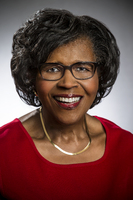 Interview: Harris, M. Wilma, 2015 M. Wilma Harris was born in 1944 in Paulsboro, New Jersey. She attended Douglass College and graduated with a history degree in the Class of 1966. She went on to earn her master's degree in Governmental Administration from the University of Pennsylvania. Harris worked at Douglass College as Counselor-in-Residence, Assistant Dean of Students and Associate Dean of Students. In 1977, Harris began working at Prudential and spent the rest of her career there, eventually becoming Vice President of Human Resources. Harris has an honorary doctorate from St. Peter's College.
Interview: Harris, M. Wilma, 2015 M. Wilma Harris was born in 1944 in Paulsboro, New Jersey. She attended Douglass College and graduated with a history degree in the Class of 1966. She went on to earn her master's degree in Governmental Administration from the University of Pennsylvania. Harris worked at Douglass College as Counselor-in-Residence, Assistant Dean of Students and Associate Dean of Students. In 1977, Harris began working at Prudential and spent the rest of her career there, eventually becoming Vice President of Human Resources. Harris has an honorary doctorate from St. Peter's College. -
Interview: Hyndman, Arnold, 2016Born in Los Angeles, California, Dr. Hyndman was interested in science from a young age and was encouraged by his teachers to attend programs and assist with research, prompting a career in science and education. During his time in high school, he was able to participate in summer research programs with institutions such as the University of Southern California in their marine animal laboratory. Dr. Hyndman participated in a school walkout after the assassination of Dr. Martin Luther King, Jr. After graduating high school in 1970, Dr. Hyndman went on to attend Princeton University, majoring in Biology. Building on the work of his bachelor’s degree, Dr. Hyndman returned to California to attend graduate school at the University of California, Los Angeles from 1974 to 1978 and he earned his Ph.D. in Philosophy and Neuroscience. During his graduate work, Dr. Hyndman was actively involved in recruiting more students of color to the biology department. He also made quick use of the teaching credentials he obtained from Princeton, working, over the summers, with an Upward Bound program, bringing inner city young people to college and university campuses and preparing them for college life. Dr. Hyndman took his first post-doctoral assignment at Ohio State University in the medical school working on research, before finding himself presented with offers for positions at both the University of California (UCSD), San Diego and at Livingston College. Dr. Hyndman worked out a compromise wherein he asked Rutgers to hold the position for a year, while he went to UCSD to complete a second post-doctoral program. While working at UCSD, Dr. Hyndman and his collaborators developed a cell culture technique and were among the early describers of the natural cell division and replication of post-mitotic cells. Dr. Hyndman’s work helped to illustrate that there are cells in our brains that continue to divide. In 1981, Dr. Hyndman became assistant professor in the Department of Biological Science at Rutgers University, during which time the faculty reorganized into the Faculty of Arts and Sciences (FAS). He served as the founding director of what was originally called the Minority Advancement Program and held this position until becoming associate provost in 1990. Dr. Hyndman established mechanisms to prime the coordination and funding for campus-based retention programs and provided administrative guidance for programs such as the establishment of the university’s Latino Cultural Center and the Asian Cultural Center. Dr. Hyndman then served as the Dean of Livingston College from 1993 until 2007. Since 2001, he has been the director of the Organizational Leadership Program. From 2001 to 2008, he also served as the director of the Criminal Justice Program. Dr. Hyndman is a professor in the Department of Cell Biology and Neuroscience. Dr. Hyndman served on the New Jersey State Board of Education, in addition to consulting for organizations such as SLS and Janssen Pharmaceuticals. He has obtained numerous credentials, including being an ordained Christian Minister, a New Jersey Teaching Credential, and membership in such organizations as the International Leadership Society and the Center for Bioethics and Human Dignity. He also serves as Chair of the Elder Board at Abundant Life Community Church, a position he has held since 2012. Dr. Hyndman is Secretary and Treasurer on the Executive Board of the Warren County National Alliance on Mental Illness.
-
Interview: Jones-Hicks, Delora, 1991Delora Jones-Hicks was secretary for the Business and Industrial Coordinating Council before joining Rutgers-Newark's Office of Public Information in 1968. During her time at the university, she wrote press releases, developed relationships with news organizations, planned events, and was in charge of public relations with the surrounding community. She also served as chair of the Organization of Black Faculty and Staff.
-
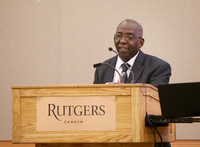 Interview: Jones, Roy L., 2021 Roy L. Jones was born in Fort Lauderdale, Florida in 1946. He spent his early years in segregated Fort Lauderdale. In 1957-'58, he moved to Atlantic City, along with his mother and four brothers, following an aunt who had moved there in the 1940s. He shares his experiences growing up in the Black community in Atlantic City. After attending two HBCUs, he went to University College at Rutgers-Camden and then enrolled in the Rutgers Camden College of Arts and Sciences (CCAS), graduating in 1970. At CCAS, he was active in the Black Student Unity Movement (BSUM). In the interview, he discusses the demands of the BSUM for greater inclusivity and diversity at the University and the takeover of the College Center on February 26-27, 1969. He helped found the Black Cooperative Association, or Black Co-op, in Camden, which provided food, housing, childcare, healthcare and engagement in the arts. He was also a part of the Cooper-Grant Neighborhood Association, which opposed gentrification in Camden. In the second interview, Jones discusses his experiences as an EOF administrator at Rutgers-Camden and his involvement in the Black student protest movement. He also shares remembrances of the Camden uprisings. His work in environmental justice began in 1971 with opposition to building an incinerator in Camden and has continued through involvement in organizations such as the South Jersey Environmental Justice Alliance and the National Institute for Healthy Human Spaces. He delves into his work in addressing water safety issues in Camden and in the city's public schools. He became a Senior Environmental Fellow in 2008 and has authored several publications, including Toxic Schools in New Jersey. This interview was recorded as part of the Black Camden Oral History Project.
Interview: Jones, Roy L., 2021 Roy L. Jones was born in Fort Lauderdale, Florida in 1946. He spent his early years in segregated Fort Lauderdale. In 1957-'58, he moved to Atlantic City, along with his mother and four brothers, following an aunt who had moved there in the 1940s. He shares his experiences growing up in the Black community in Atlantic City. After attending two HBCUs, he went to University College at Rutgers-Camden and then enrolled in the Rutgers Camden College of Arts and Sciences (CCAS), graduating in 1970. At CCAS, he was active in the Black Student Unity Movement (BSUM). In the interview, he discusses the demands of the BSUM for greater inclusivity and diversity at the University and the takeover of the College Center on February 26-27, 1969. He helped found the Black Cooperative Association, or Black Co-op, in Camden, which provided food, housing, childcare, healthcare and engagement in the arts. He was also a part of the Cooper-Grant Neighborhood Association, which opposed gentrification in Camden. In the second interview, Jones discusses his experiences as an EOF administrator at Rutgers-Camden and his involvement in the Black student protest movement. He also shares remembrances of the Camden uprisings. His work in environmental justice began in 1971 with opposition to building an incinerator in Camden and has continued through involvement in organizations such as the South Jersey Environmental Justice Alliance and the National Institute for Healthy Human Spaces. He delves into his work in addressing water safety issues in Camden and in the city's public schools. He became a Senior Environmental Fellow in 2008 and has authored several publications, including Toxic Schools in New Jersey. This interview was recorded as part of the Black Camden Oral History Project. -
Interview: Lawrence, Lincoln, 1991Lincoln Lawrence grew up in Jersey City and received his bachelor of science from Jersey City State College and a master's degree in school administration and supervision from Seton Hall. From 1963 to 1967 he was a science teacher and cultural coordinator at West Kinney Junior High School in Newark. He later worked as supervisor of math and science teachers and director of School Audio-Visual Materials Center for the city of Newark and instructor of manpower training at the Montgomery School in Newark. In 1968 he became assistant director of admissions for the Rutgers-Newark campus, and from 1970 to 1987 he served as Assistant Dean of the Faculty of Arts and Sciences of Newark.
-
Interview: Ramsey, James H., 1992James Ramsey holds a bachelor's degree from Tennessee State University and a master's in education from Brown University. He began his career as a biology teacher in Cedar Grove, New Jersey, and joined Rutgers-Newark as a professor of biology in the Academic Foundations Department in 1969; he was appointed its director in 1970. The Academic Foundations Department provided remedial programs for students who were underprepared for college work. Ramsey was key in developing the center and making it an integral part of the university. Ramsey later served as mayor of Montclair, New Jersey, from 1984-1986 and on the Montclair board of education. He has also been active in numerous civic affairs in the City of Newark.

